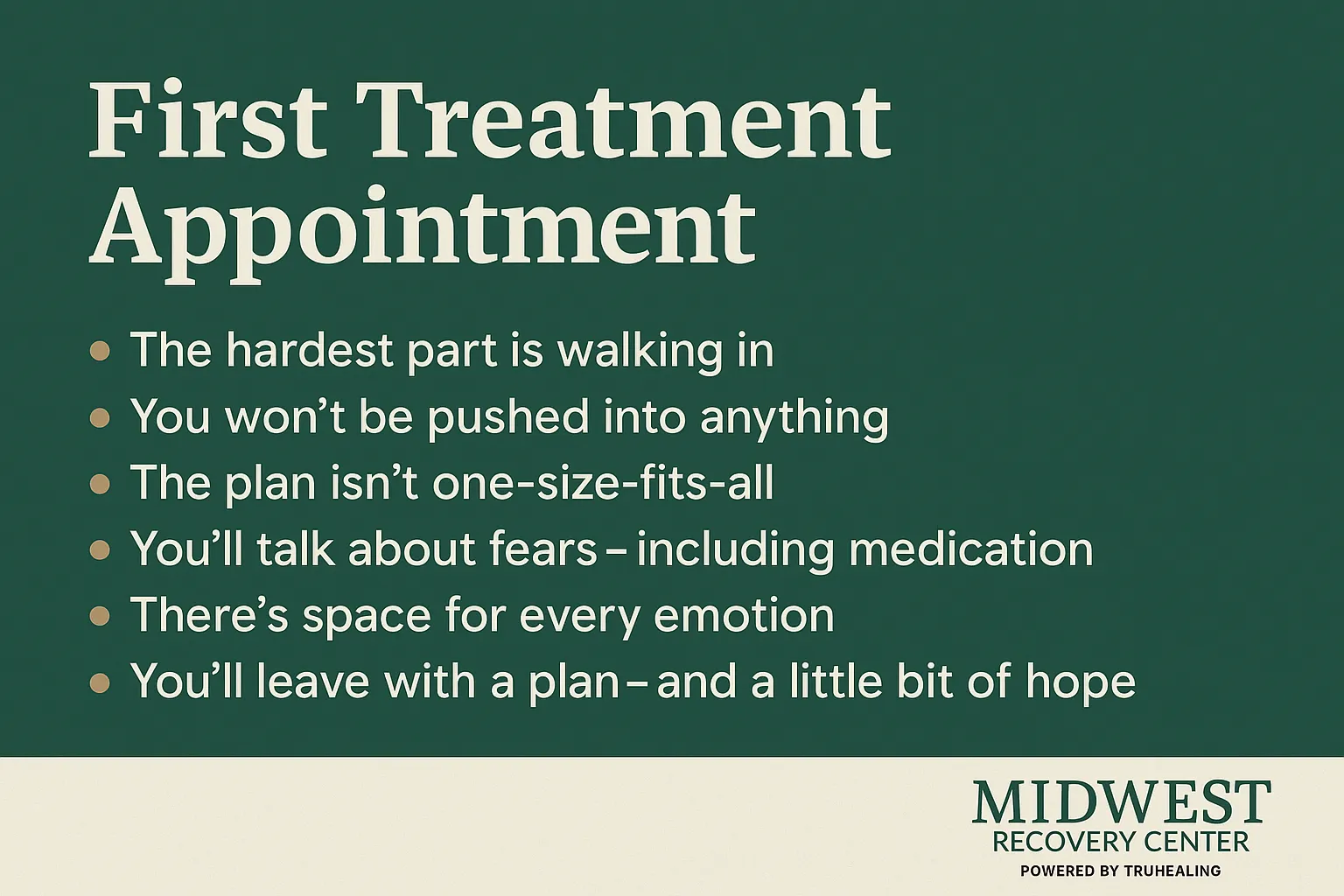You’ve made the call. Maybe it took days—or months—to build up the courage. You hung up the phone and felt both relief and panic in the same breath. Now, your first alcohol addiction treatment appointment is on the calendar, and your mind won’t stop racing: What do I say? What if they judge me? What if I can’t do this?
If you’re here, you’re not weak—you’re ready. Starting treatment isn’t the end of control; it’s the first honest moment of peace you’ve probably had in a long time.
At Midwest Recovery Center, we know that first appointment can feel like walking into the unknown. But here’s what actually happens—and why most people leave feeling lighter than they expected.
1. The Hardest Part Is Walking In
Every person who walks through those doors has felt some version of what you’re feeling right now—fear, guilt, shame, or maybe even numbness. You’re not supposed to have it all figured out yet. That’s why you’re coming.
Most first appointments start with something simple: a greeting, a smile, maybe a cup of water. You’ll sit down with an intake specialist who isn’t there to interrogate you—they’re there to listen. No judgment. No labels. Just space to tell your story in your own words.
You might hear yourself say things you’ve never said out loud. And that’s okay. That’s how healing starts.
2. You Won’t Be Pushed Into Anything
This isn’t an intervention or a trap. The goal of the first appointment isn’t to force decisions—it’s to understand you.
You’ll talk about your alcohol use, your health, your mood, your sleep, and what’s been hardest lately. The clinician will ask questions, but they’re not checking boxes—they’re connecting dots.
If medication is mentioned, it’s never a demand. It’s an option that’s explained, not imposed. Many people beginning alcohol addiction treatment worry about “being put on something,” but most plans are collaborative. You have agency every step of the way.
3. The Plan Isn’t One-Size-Fits-All
Recovery looks different for everyone. Some people begin with detox, others move right into partial hospitalization or outpatient care. At Midwest Recovery, your team will tailor a plan around your life—not the other way around.
That means factoring in your work schedule, your family, and your mental health. Maybe you’ll start in a partial hospitalization program (PHP) for structured daily support. Maybe intensive outpatient (IOP) makes more sense because you’re still working.
The first appointment is where that conversation begins—where treatment stops being theoretical and starts becoming personal.
If you’re local, you might explore alcohol addiction treatment in Lambertville, Michigan, or nearby Perrysburg, Ohio. Local programs mean you can stay connected to your community while building new habits.
4. You’ll Talk About Fears—Including Medication
It’s normal to be scared of medication. Maybe you’ve seen someone misuse it, or maybe you’ve always believed recovery should be “natural.” But in reality, medication is just one of many tools that can make recovery safer and more sustainable.
If you discuss medication, your provider will explain what it does, how it helps, and what side effects to expect. You won’t be given anything on the spot unless you choose it.
The truth? Many people who were once terrified of MAT (Medication-Assisted Treatment) later describe it as the key that helped them finally focus on therapy instead of cravings. The goal isn’t sedation—it’s stability.

5. There’s Space for Every Emotion
You might cry. You might sit in silence. You might laugh unexpectedly at something small—and feel human again for the first time in months.
Your clinician won’t be surprised by any of it. They’ve seen how complex early recovery emotions can be: relief tangled with fear, guilt mixed with gratitude. You’re allowed to feel all of it.
Sometimes, clients describe that first appointment as the moment their mask starts to crack—and instead of breaking, they breathe.
6. You’ll Leave With a Plan—and a Little Bit of Hope
When the appointment ends, you’ll walk out with something concrete:
- A personalized care plan
- Contact information for your care team
- And, most importantly, the next step
For some, that next step is showing up the next morning for group therapy. For others, it’s calling their family to say, “I started.”
You may not feel “better” yet, but you’ll know this: you’re no longer standing still.
7. You Don’t Have to Be 100% Ready to Begin
People often think they need full confidence before starting treatment. That’s not true. Most people arrive with 60% fear, 30% exhaustion, and maybe 10% hope. That’s enough.
Recovery isn’t about certainty—it’s about movement. And once you’ve taken that first appointment, the momentum builds from there.
One client once described it perfectly:
“I didn’t walk into treatment ready to quit drinking forever. I just wanted to stop feeling hopeless. And somehow, that was enough.”
8. What Happens Next
After your first session, your care team will check in—usually within 24 hours—to confirm your next appointment or level of care. You’ll be assigned a primary therapist and support staff who’ll stay with you throughout your treatment.
You’ll learn coping tools, participate in group therapy, and, for many, discover that recovery isn’t isolation—it’s connection. You’ll meet people who’ve been exactly where you are now, and they’ll remind you what’s possible.
That first appointment? It’s not a test. It’s a beginning.
FAQs About Starting Alcohol Addiction Treatment
1. What should I bring to my first appointment?
Just yourself—and any medical or insurance information you have. You don’t need to prepare a speech or perfect your story. Honesty is all that matters.
2. Will I have to stop drinking right away?
Your clinician will help you decide the safest approach. For some, a medically supervised detox comes first. For others, treatment starts with outpatient support while working toward sobriety.
3. What if I change my mind after the appointment?
You can always pause, ask questions, or take time to think. Recovery is built on choice, not pressure.
4. How long does the first appointment take?
Typically 60–90 minutes. Enough time to talk about your history, your goals, and to build a plan you feel comfortable with.
5. Will I be judged or labeled?
No. Midwest Recovery Center operates from a foundation of respect and understanding. Addiction is treated as a medical and emotional condition—not a personal failure.
6. What if I’m not ready for inpatient care?
That’s okay. Programs like intensive outpatient and partial hospitalization provide strong structure while allowing flexibility for work or family responsibilities.
You Deserve to Feel Safe in This Beginning
You don’t have to be perfect to start treatment—you just have to be present. That first appointment isn’t about proving anything; it’s about letting someone help you carry what’s been too heavy to hold alone.
Call (888) 657-0858 to learn more about our alcohol addiction treatment services in Toledo, Ohio. Whether you’re scared, skeptical, or simply curious—this is a place where your healing can begin, one honest conversation at a time.


























